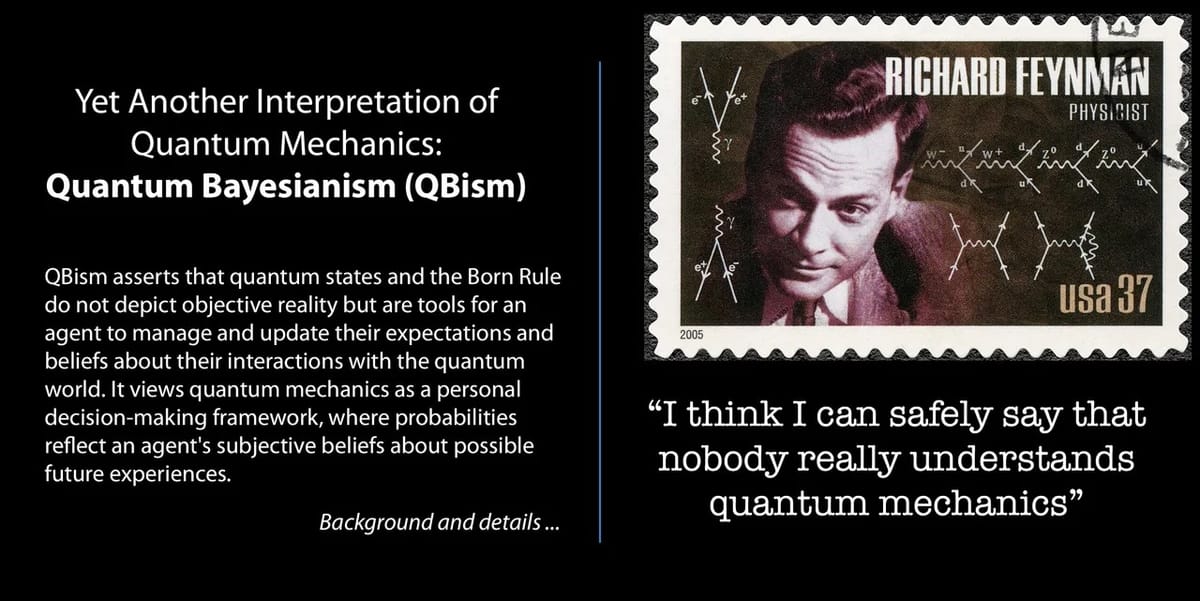I have always been fascinated by different interpretations of quantum mechanics, such as those that describe the physical world or those that encapsulate an agent's experiences.
One interpretation I recently explored is Quantum Bayesianism (QBism), which focuses on an agent's experiences. In QBism, quantum states represent an agent's beliefs about future experiences, and the Born Rule is a tool within QBism that assigns probabilities to these experiences.
Basic Ideas
In QBism, quantum states and the Born Rule are not about describing objective reality but are tools for an agent to manage and update their expectations and beliefs about their interactions with the quantum world. QBism recasts quantum mechanics as a form of personal decision theory, where the theory's laws help individuals make the best predictions they can, given their limited information about the world. The core ideas include:
- Quantum States as Beliefs: In QBism, quantum states do not represent the physical properties of quantum systems. Instead, they reflect the beliefs or knowledge an observer (the "agent") has about what they might experience when interacting with a quantum system. This perspective, markedly different from other interpretations such as the many-worlds or Copenhagen interpretations, emphasizes the subjective nature of quantum states and the personal Bayesian approach to probability assignments in quantum theory.
- The Role of the Born Rule: The Born Rule is a fundamental rule in quantum mechanics that provides a way to calculate the probabilities of different possible outcomes of a quantum measurement. In QBism, the Born Rule is more than just a tool for calculating probabilities—it is a normative rule that guides an agent's assignment of probabilities based on their personal beliefs and the quantum state they ascribe to the system. Thus, the Born Rule instructs an agent on how to update their beliefs about the system upon performing a measurement.
Related Concepts: Agent, Experience, and Belief
- Agent: In Quantum Bayesianism, an agent is someone who assigns a quantum state to a system based on their beliefs about the system and their possible future experiences with it. These credences, or beliefs, are informed by the Born Rule, a mathematical equation used in quantum mechanics to predict the probability of various outcomes. These credences are subjective and personal to the agent.
- Experience: Experience is a critical factor in QBism when assigning a quantum state. The agent's beliefs about the system are shaped by past interactions, and their beliefs are updated based on the likelihood of future experiences.
- Belief: Belief in QBism refers to an agent's subjective degree of confidence in a particular outcome, informed by past experiences, which then shapes predictions about future experiences.
Background and Interpretations of Quantum Mechanics
Quantum mechanics governs the microscopic realm, characterized by particles in states of superposition, encoded by wavefunctions. The transition to the macroscopic world, where we observe definite outcomes, occurs solely through the act of measurement, presenting the measurement problem.
Dominant Interpretations
Several hypotheses attempt to resolve the measurement problem:
- Copenhagen Interpretation: Believes collapse occurs spontaneously with measurement, without an underlying mechanism.
- Many-Worlds Interpretation: Posits that every potential outcome occurs in a distinct parallel universe.
- Decoherence Theory: Suggests that interaction with the environment disrupts a quantum system's coherence, leading to observable results.
- Pilot Wave Theory (de Broglie-Bohm): Proposes the coexistence of particles and a guiding 'pilot wave' in the quantum realm.
- Hidden Variables Theories: These suggest unseen factors predetermine the outcomes of measurements, though recent experiments largely discount this view.
- QBism (Quantum Bayesianism): Views quantum mechanics as a personal tool where quantum states and the Born Rule represent an agent's subjective beliefs about potential experiences.
My View
Despite years of inquiry, none of the above interpretations has been definitively validated, leaving the Measurement Problem as a profound mystery and a reminder of the limitations of our grasp on reality. I believe that there are genuine boundaries that we simply cannot transcend in our physical realm. The measurement problem in quantum mechanics underscores the separation of our human realm from the microscopic realm.
References
https://plato.stanford.edu/entries/quantum-bayesian/
https://www2.perimeterinstitute.ca/personal/cfuchs/Oviedo.pdf



Member discussion: